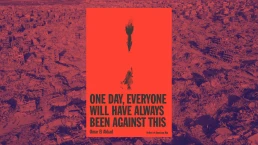Akkad’s prose is an appeal to readers not to wait for “one day” in the distant future to resist injustice not only in Gaza, but in the wider world
By Charles Glass
Egyptian-born Omar El Akkad had studied in the United States and been 10 years a journalist when, in the summer of 2021, he became an American citizen. Covering the War on Terror in Afghanistan and at the U.S. detention center in Guantanamo Bay exposed him to the “deep ugly cracks in the bedrock of this thing they called “the free world.” Yet he believed the cracks could be repaired – “Until the fall of 2023. Until the slaughter.”
The slaughter was Israel’s razing of Gaza following Hamas’s rampage into Israel on October 7, 2023. The Israeli assault escalated to include massive bombardment, enforced hunger, destruction of hospitals and schools, bulldozing of dwellings deprivation of medical care, torture and the slaughter of tens of thousands of men, women and children. The onslaught caused Akkad to despair for Gaza’s Palestinians and for his adopted country, whose financing and weapons enabled it. He channelled that despair into the rage that inspired this excellent and troubling book.

One Day, Everyone Will Have Always Been Against This is neither polemic nor memoir, although it contains elements of both. Akkad’s prose is an appeal to readers not to wait for “one day” in the distant future to resist injustice not only in Gaza, but in the wider world: “In the coming years there will be much written about what took place in Gaza, the horrors that have been meticulously documented by Palestinians as they happened and meticulously brushed aside by the major media apparatus of the western world.” When the killing ceases, as with genocides of native Americans, Tasmanians, Namibia’s Hereros and Namas, Armenians, Jews and Tutsis, it will be too late.
Akkad’s condemnation of U.S. policy in the formerly-colonized world sits uneasily beside his choice to live and raise his children in the land that torments people who, like him, are brown or Muslim or doomed to live under American-supported Arab dictators or Israeli occupation. His rationale is as simple as it is understandable: “I live here because it will always be safer to live on the launching side of the missiles. I live here because I am afraid.”
He is unafraid to speak against the Biden administration’s veto of United Nations resolutions calling for ceasefires in Gaza (“untroubled when they say a ceasefire resolution represents a greater threat to lasting peace than the ongoing obliteration of an entire people”) and its termination of funding for the UN Relief and Works Agency (UNRWA) that was the primary supplier of food, medical care and education to Palestinian refugees. Yet speaking out seems futile. As the author of the award-winning novel American War and sometime columnist, he does not spare himself and other writers for political impotence: “What is this work we do? What are we good for?” He quotes Egyptian-American poet Marwa Helal:
this is where the
poets will say: show, don’t tell
but that
assumes most people
can see.
Too many seek refuge in propaganda that what is being done to Palestinians is necessary. Akkad quotes an Israeli newspaper post’s headline from seven months prior to October 7: “When Genocide is Permissible.” Palestinians are killed every day in Gaza, “but the unsaid thing is that it is all right because that’s what those people do, they die.”
This book is not devoid of hope, which he finds in resistance that can be positive (“showing up to protests and speaking out”) and negative (“refusing to participate”). He praises students “risking expulsion and defamation, risking their livelihoods, their entire careers” and Jewish protestors “being arrested on the streets of Frankfurt, blocking Grand Central Station in New York, fighting for peace.” Their efforts, however ineffective, absolve them of the culpability of waiting for everyone else to be “against this.”
Charles Glass is a writer, journalist and broadcaster, who has written on conflict in the Middle East, Africa and Europe for the past 50 years. He was ABC News Chief Middle East Correspondent from 1983 to 1993 and has covered wars in Lebanon, Syria, Eritrea, Rhodesia, Somalia, Iraq, East Timor and Bosnia-Herzegovina. His many books have dealt with the First and Second World Wars as well as contemporary Middle East history.
Recent Posts
New Addition to List of Nuclear Near Catastrophes
February 25, 2026
Take Action Now Debris flew for great distances — many times the distance of 270 meters to a nuclear reactor and nuclear storage facility.By David…
Gavin Newsom’s last budget belies his ‘California for All’ pledge
February 24, 2026
Take Action Now Yet, even as the state is poised to lose billions in federal funding, and millions of Californians are losing access to health care…
Israel and American Hawks are Pushing U.S. to Iran War With Catastrophic Consequences
February 23, 2026
Take Action Now At the World Health Assembly in May, member states may endorse an unprecedented strategy declaring that health is not a cost – but…
A Child’s View of the Attack on Venezuela. And a Peace Flotilla
February 23, 2026
Take Action Now Fabricio said that he and his family went out of their building and saw many people also going outside, running around, and kids…




